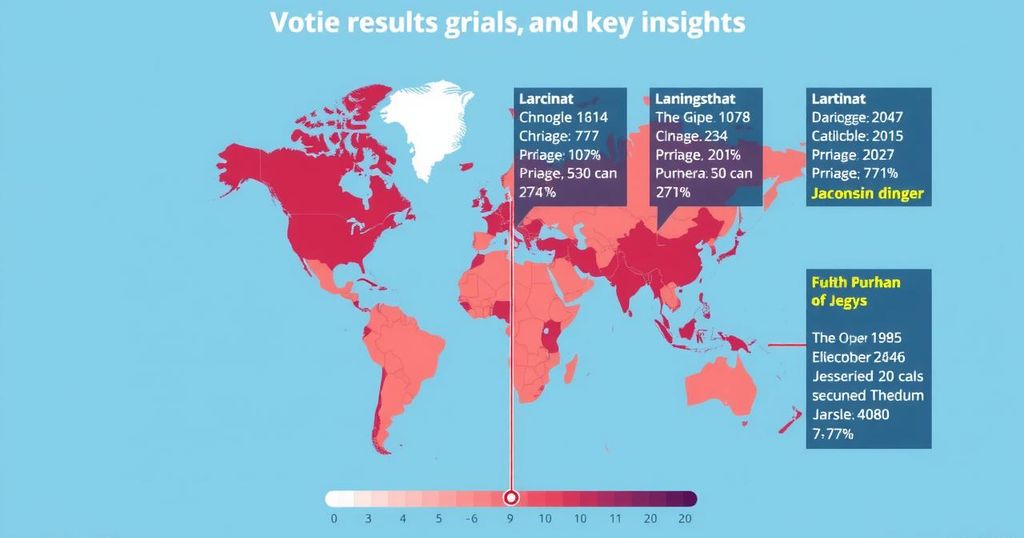The 2024 Elections: A Reflection on Democracy’s Evolving Landscape

In 2024, nearly half the global population cast votes in more than sixty countries, marking a significant moment in democratic history. While incumbent leaders like Joe Biden and Narendra Modi faced challenges, the election revealed a tendency for voters to prioritize immediate economic concerns over long-term issues such as climate change. Key electoral shifts highlight an existing tension between populism and democratic values, with significant implications for future governance.
In 2024, nearly half of the global population participated in elections, a historic feat reflecting a maturing democracy. Over sixty nations collectively navigated complex issues, with voter behavior strongly influenced by immediate economic concerns rather than long-term global dilemmas such as climate change. This election cycle saw significant electoral losses among incumbents, including President Joe Biden and UK’s Labour Party defeating the Conservatives, underscoring a prevalent trend of voters prioritizing short-term economic realities over future risks.
Among the most notable outcomes was Donald Trump’s return to the presidency, despite his controversial past. This electoral choice highlighted a global tendency, wherein voters often prioritized personal economic comfort above collective progression. Leaders like Prime Minister Narendra Modi of India, Chancellor Olaf Scholz of Germany, and others also faced declines in support, primarily linked to poor economic performances exacerbated by external factors including the aftermath of the pandemic and the ongoing war in Ukraine.
Macron’s parliamentary strategy, in response to a strong showing from right-wing populists, illustrated the delicate balance faced by contemporary leaders struggling to maintain control against shifting electoral tides. Conversely, Vladimir Putin’s overwhelming electoral success in Russia served as a stark reminder of the pitfalls of democracy, compromised by authoritarianism and the suppression of opposition voices.
Looking forward, the relationship between re-elected leaders Trump and Putin poses significant implications for global stability, particularly in relation to Ukraine. Trump’s commitment to altering US foreign policy and the strategic balance in Europe raises concerns about the future of democratic values worldwide. The dynamics observed in 2024 serve as an essential reminder of the impact of each nation’s electoral decisions on global trends, highlighting the interconnectedness of contemporary governance.
As nations grapple with internal dissent and the pursuit of democratic ideals, the lessons of this election cycle resonate strongly—for leaders and citizens alike. The global movement toward democracy is far from over, as evidenced by emerging democracies and voter enthusiasm in places once marred by oppressive regimes, such as Syria.
The events of 2024 mark a significant moment in global democratic engagement, as nearly half the world participated in elections, signaling a shift in electoral dynamics. The intertwined challenges of economic hardship, climate change, and political populism shaped voter priorities, leading to a discernible rejection of incumbents in several key nations. This election cycle illuminated the persistent value of immediate economic concerns over broader existential threats, indicating the current state of public sentiment across diverse political landscapes. Moreover, the contrasting experiences of leaders in various nations underscore the broader implications of electoral choices on global governance, regional stability, and the future of democracy itself.
The electoral outcomes of 2024 have pronounced implications for global democracy, showcasing a dual narrative of popular unrest and a quest for responsive governance. While many incumbents faced significant pushback due to economic dissatisfaction, the rise of populist sentiments presents both challenges and opportunities for progressive policies worldwide. Moreover, the interconnected nature of contemporary politics emphasizes that decisions made within individual nations resonate far beyond their borders, affecting larger geopolitical landscapes and democratic norms. It remains crucial that the progress achieved in democratic participation is safeguarded against regression as the world emerges from economic turmoil and political upheaval.
Original Source: edition.cnn.com







